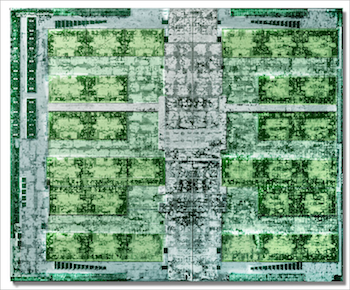CIS 601: Special Topics in Computer Architecture: GPGPU Programming Spring 2017
Course Information
instructor: Joe Devietti
when: Tuesday/Thursday 10:30-noon
where: Towne 321
contact: piazza, email, canvas
office hours:
- Tuesday 2-3pm, Levine 572
Course Description
Graphics Processing Units (GPUs) have become extremely popular and are used to accelerate an increasingly diverse set of non-graphics workloads. This seminar will examine modern GPU architectures, the programming models used to write general-purpose code for GPUs, and the complexities of programming such highly parallel architectures. There will be a special emphasis on concurrency correctness issues as they relate to GPUs, including GPU memory consistency models and GPU concurrency bugs. Graduate-level coursework in computer architecture (e.g., CIS 501) will be very helpful.
Course Materials
No textbooks are required; links to all readings will be provided at this website.
Grading
- Project: 40%
- Participation: 20%
- Assignments: 15%
- Future work write-ups: 15%
- Paper questions: 10%
There will be no exams.
Submit homework, paper questions and future-work write-ups via Canvas
The class project can be done alone or in groups of 2. The project is open-ended: it should be something related to GPUs but the specifics are up to you. Choosing a project that incorporates your interests (research or otherwise) is a great idea!
Course Schedule
This schedule is subject to change
| Date | Topic | Presenter |
|---|---|---|
| Thursday 12 Jan | Intro | Joe |
| Tuesday 17 Jan | CUDA Basics | Joe |
| Thursday 19 Jan | GPU Architecture Overview | Joe |
| Tuesday 24 Jan | ” | Joe |
| Thursday 26 Jan | ” | Joe |
| Tuesday 31 Jan | Real-world GPU Architectures | Joe |
| Thursday 2 Feb | CUDA Performance Tuning Nsight video tutorial (memory profiling starts at 41:40), Nsight documentation | Joe |
| Tuesday 7 Feb | No class: Joe traveling | - |
| Thursday 9 Feb | No class: Joe traveling | - |
| Tuesday 14 Feb | CUDA miscellany, profiling | Joe |
| Thursday 16 Feb | CUDA Synchronization | Joe |
| Tuesday 21 Feb | A Primer on Memory Consistency and Cache Coherence, Chapters 3-5 (SC, TSO, RC) | Joe |
| Thursday 23 Feb | No class: Joe traveling | - |
| Tuesday 28 Feb | Heterogeneous-Race-Free Memory Models slides | JJ, Max |
| Thursday 2 Mar | GPU concurrency: Weak Behaviours and Programming Assumptions slides | JJ, Max |
| Tuesday 7 Mar | No class: spring break | - |
| Thursday 9 Mar | No class: spring break | - |
| Tuesday 14 Mar | Debunking the 100X GPU vs. CPU myth: an evaluation of throughput computing on CPU and GPU slides | Omar, Richard |
| Thursday 16 Mar | Rodinia Benchmark Suite slides | Grayson, Shreyas, Akshay |
| Tuesday 21 Mar | MemcachedGPU: Scaling-up Scale-out Key-value Stores | DJ, Hans |
| Thursday 23 Mar | GPUfs slides | Shreyas, Yishuai |
| Tuesday 28 Mar | Dynamic Warp Formation slides | Eric, Grayson, Romita |
| Thursday 30 Mar | Dynamic Warp Subdivision for Integrated Branch and Memory Divergence Tolerance | Kavya, Richard |
| Tuesday 4 Apr | The Dual-Path Execution Model for Efficient GPU Control Flow slides | DJ, Hans, Romita |
| Thursday 6 Apr | Cache-Conscious Wavefront Scheduling | Kavya, Akshay |
| Tuesday 11 Apr | Unifying Primary Cache, Scratch, and Register File Memories in a Throughput Processor | Archana, Shveta |
| Thursday 13 Apr | Cache Coherence for GPU Architectures | Archana, Yishuai |
| Tuesday 18 Apr | Towards high performance paged memory for GPUs | Eric, Omar |
| Thursday 20 Apr | project presentations | - |
| Tuesday 25 Apr | project presentations | - |
Project Ideas
- Investigate time savings from approximate GPU computing. Consider replacing data types with narrower-width versions, e.g., converting 64-bit doubles to 32-bit floats, or 16-bit integers to 8-bit integers. How does this affect running time and accuracy of the computation?
- Investigating scalable locking in CUDA, from simple spin-locks to something like MCS locks. The lack of coherence on GPUs should add an interesting wrinkle. Useful resources are Michael Scott’s webpage and the SSync library from EPFL.
- Port an application of interest to you to CUDA.
- your idea here!
